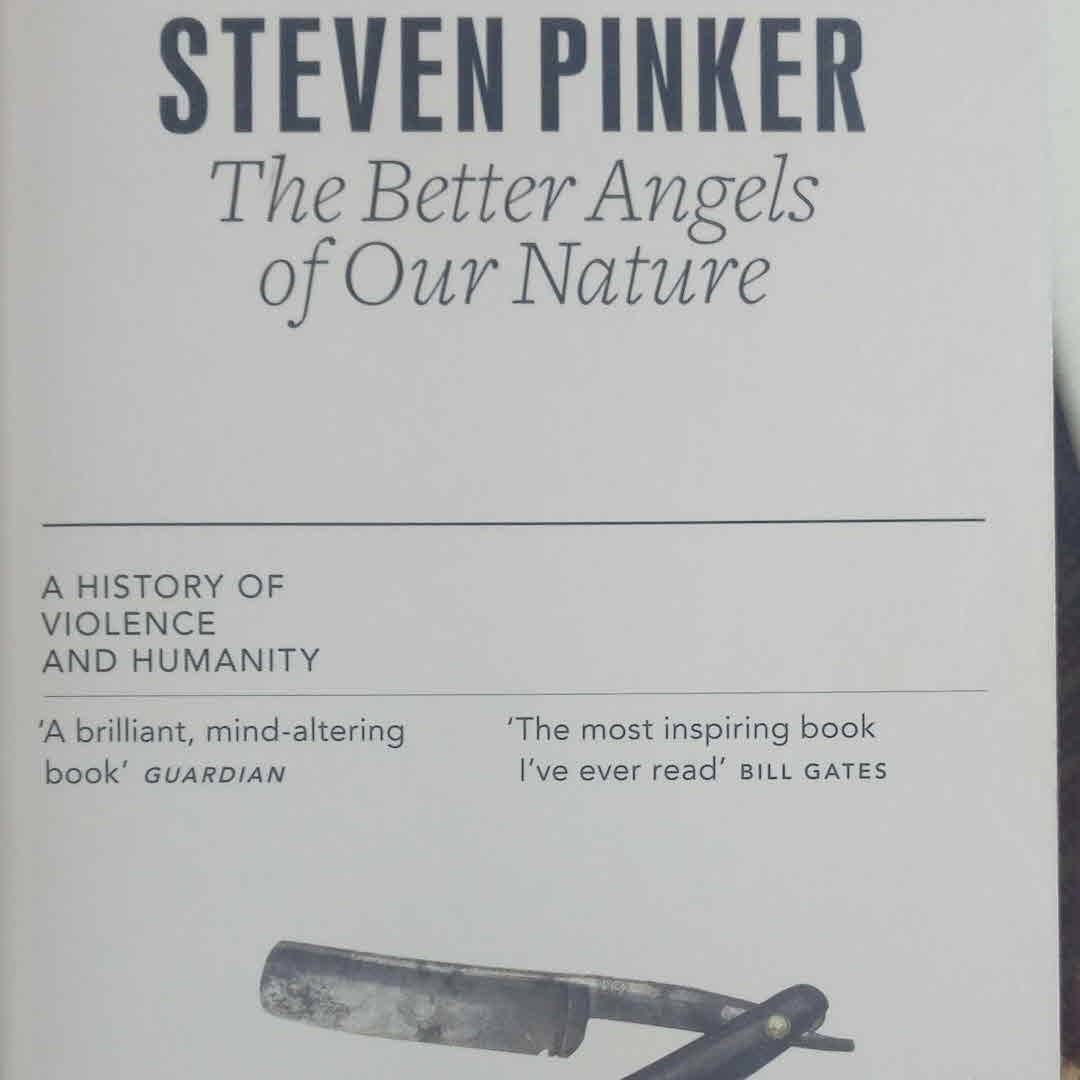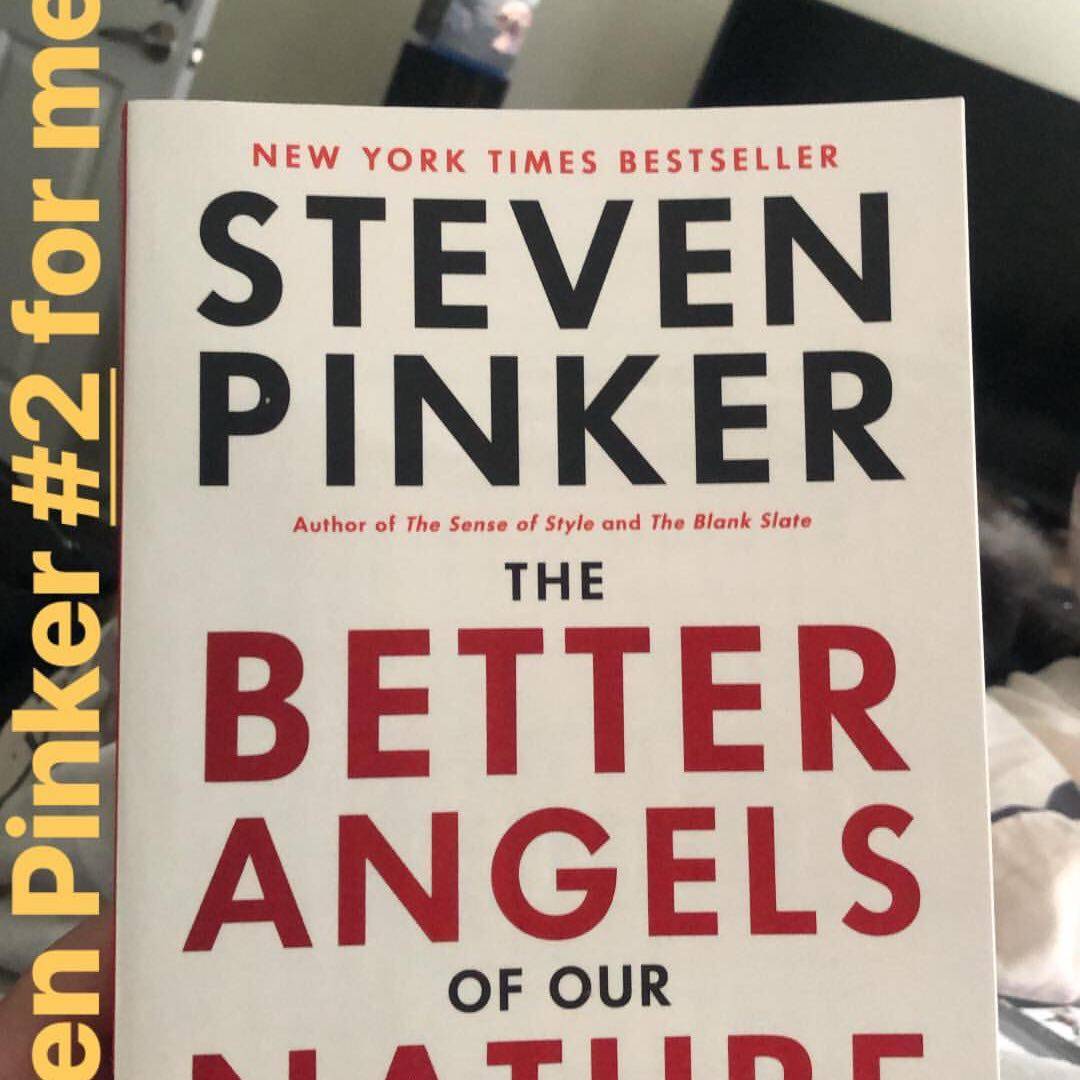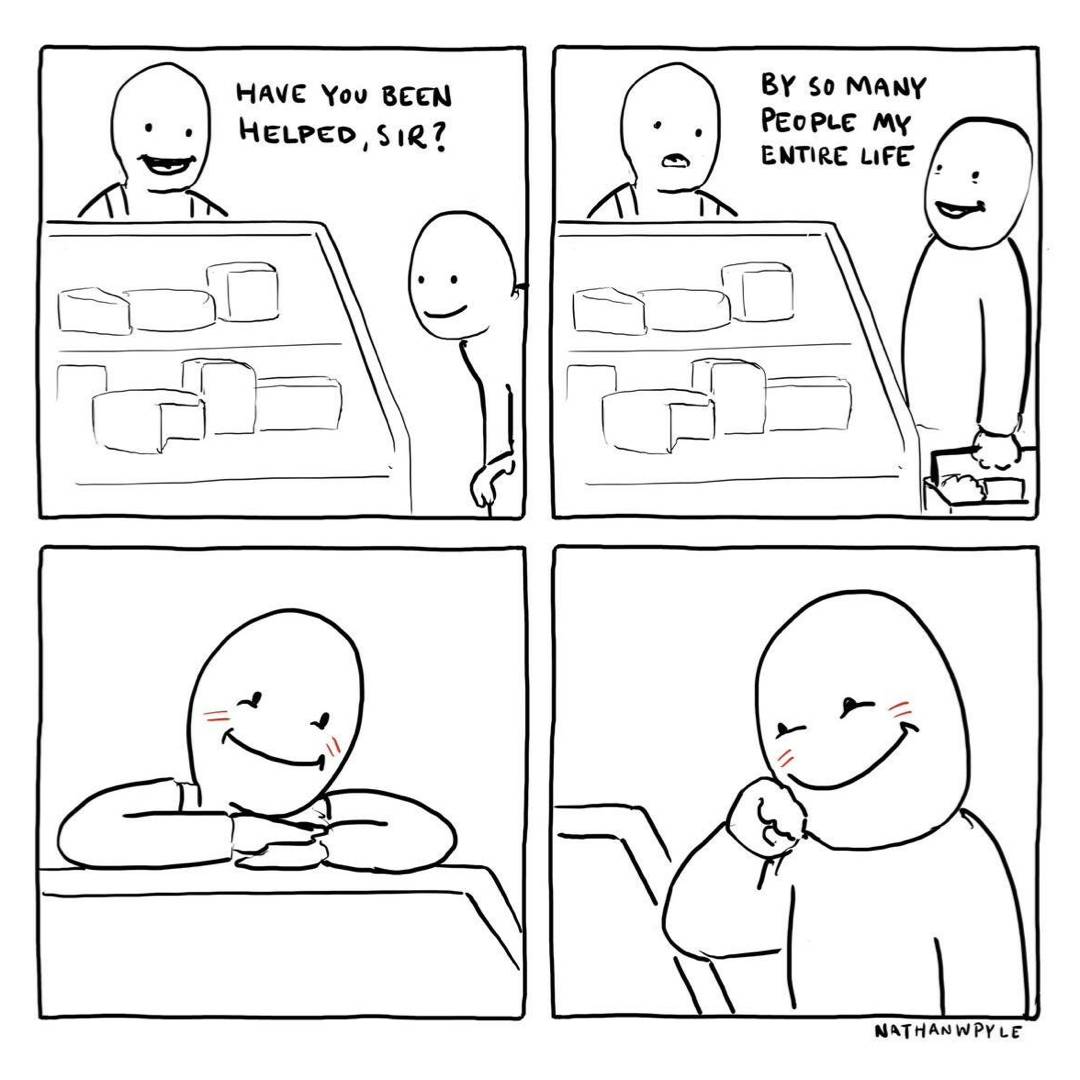Golden Arches theory: no two countries with a McDonald‘s have ever fought in a war.
Golden Arches theory: no two countries with a McDonald‘s have ever fought in a war.
James Payne notes a perverse sign of progress. Today‘s Holocaust deniers at least feel compelled to deny that the Holocaust took place. In earlier centuries the perpetrators of genocide and their sympathizers boasted about it.
Once you start rummaging around in the realm of the unverifiable there is considerable room for creativity, and accusations of sorcery are often blended with self-serving motives. Tribal people, anthropologists have shown, often single out despised in-laws for allegations of witchcraft
A great principle of moral advancement, on par with "Love thy neighbor" and "All men are created equal," is the one on the bumper sticker: "Shit happens.
Setting fire to a person and seeing whether he burns is a dumb way to determine his guilt.
Believe it or not—and I know that most people do not—violence has declined over long stretches of time, and today we may be living in the most peaceable era in our species‘ existence.
Parker Brothers tried to introduce a German version of Risk, the board game in which players try to dominate a map of the world, the German government tried to censor it. (Eventually the rules were rewritten so that players were “liberating” rather than conquering their opponents‘ territories.)
In the nature of man we find three principal causes of quarrel: gain (predatory raids), safety (preemptive raids), and reputation (retaliatory raids).
The shift is not toward complacency: we enjoy the peace we find today because people in past generations were appalled by the violence in their time and worked to reduce it, and so we should work to reduce the violence that remains in our time.
Does it never strike you as puzzling that it is wicked to kill one person, but glorious to kill ten thousand?
The truth is, I don‘t know what will happen across the entire world in the coming decades, and neither does anyone else. Not everyone, though, shares my reticence. A Web search for the text string “the coming war” returns two million hits, with completions like “with Islam,” “with Iran,” “with China,” “with Russia,”... Who knows? Maybe they‘re right. My aim in the rest of this chapter is to point out that maybe they‘re wrong.
The career of dueling showcases a puzzling phenomenon we will often encounter: a category of violence can be embedded in a civilization for centuries and then vanish into thin air. When gentlemen agreed to a duel, they were fighting not for money or land or even women but for honor, the strange commodity that exists because everyone believes that everyone else believes that it exists.
This mindset, known as loss aversion, the sunk-cost fallacy, and throwing good money after bad, is patently irrational, but it is surprisingly pervasive in human decision-making. People stay in an abusive marriage because of the years they have already put into it, or sit through a bad movie because they have already paid for the ticket, or try to reverse a gambling loss by doubling their next bet...
Religion thrives on woolly allegory, emotional commitments to texts that no one reads, and other forms of benign hypocrisy.
Sympathy and guilt...operate within a circle of communal relationships. They are less likely to be felt in...equality matching relationships, the kind we have with acquaintances, neighbors, colleagues...Exchange relationships are regulated by norms of fairness...The businesslike quid pro quo negotiations that can repair an exchange relationship are...generally taboo in our communal relationships
Everything in human affairs is connected to everything else, and that is especially true of violence. Across time and space, the more peaceable societies also tend to be richer, healthier, better educated, better governed, more respectful of their women, and more likely to engage in trade
The collapse of communism and a recognition of its economic and humanitarian catastrophes took the romance out of revolutionary violence and cast doubt on the wisdom of redistributing wealth at the point of a gun.
Positive-sum games also change the incentives for violence. If you‘re trading favors or surpluses with someone, your trading partner suddenly becomes more valuable to you alive than dead.
Self-control has been credited with one of the greatest reductions of violence in history, the thirtyfold drop in homicide between medieval and modern Europe. Recall that according to Norbert Elias‘s theory of the Civilizing Process, the consolidation of states and the growth of commerce did more than just tilt the incentive structure away from plunder. It also inculcated an ethic of self-control that made continence and propriety second nature.
The shocking truth is that until recently most people didn‘t think there was anything particularly wrong with genocide, as long as it didn‘t happen to them.
Declines in violence are caused by political, economic, and ideological conditions that take hold in particular cultures at particular times. If the conditions reverse, violence could go right back up.
The Bible depicts a world that, seen through modern eyes, is staggering in its savagery.
In the foreign country we call the past, crucifixion was a common punishment. It was invented by the Persians, carried back to Europe by Alexander the Great, and widely used in Mediterranean empires.
What was the lesson that the first Christians drew from crucifixion? Today such a barbarity might galvanize people into opposing brutal regimes, or demanding that such torture never again be inflicted on a living creature...No, the execution of Jesus is The Good News, a necessary step in the most wonderful episode in history. In allowing the crucifixion to take place, God did the world an incalculable favor.
A similar semianarchy burst out in parts of Central Asia and the Balkans in the 1990s, when the communist federations that had ruled them for decades suddenly unraveled. One Bosnian Croat explained why ethnic violence erupted only after the breakup of Yugoslavia: “We lived in peace and harmony because every hundred meters we had a policeman to make sure we loved each other very much.
In The Brothers Karamazov, Dostoevsky commented on Turkish atrocities in Bulgaria during the Russo-Turkish War of 1877–78, when unborn children were ripped from their mothers‘ wombs and prisoners were nailed by their ears to a fence overnight before being hanged: “People speak sometimes about the ‘animal‘ cruelty of man, but that is terribly unjust and offensive to animals. No animal could ever be so cruel as a man, ...so artistically cruel.

Also started reading this.
We are living in the most peaceful times of our history
Jerry Seinfeld once remarked that today‘s athletes churn through the rosters of sports teams so rapidly that a fan can no longer support a group of players. He is reduced to rooting for their team logo and uniforms: “You are standing and cheering and yelling for your clothes to beat the clothes from another city
The doctrine of the sacredness of the soul sounds vaguely uplifting, but in fact is highly malignant. It discounts life on earth as just a temporary phase that people pass through, indeed, an infinitesimal fraction of their existence. Death becomes a mere rite of passage, like puberty or a midlife crisis.
Reading is a technology for perspective-taking. When someone else‘s thoughts are in your head, you are observing the world from that person‘s vantage point. Not only are you taking in sights and sounds that you could not experience firsthand, but you have stepped inside that person‘s mind and are temporarily sharing his or her attitudes and reactions.
The growth of writing and literacy strikes me as the best candidate for an exogenous change that helped set off the Humanitarian Revolution.
In hermetic isolation, all kinds of bizarre and toxic ideas can fester. Sunlight is the best disinfectant, and exposing a bad idea to the critical glare of other minds provides at least a chance that it will wither and die.
events that occur at random will seem to come in clusters, because it would take a nonrandom process to space them out.
Modern biblical scholars have established that the Bible is a wiki. It was compiled over half a millennium from writers with different styles, dialects, character names, and conceptions of God, and it was subjected to haphazard editing that left it with many contradictions, duplications, and non sequiturs.
Many moral advances have taken the form of a shift in sensibilities that made an action seem more ridiculous than sinful, such as dueling, bullfighting, and jingoistic war. And many effective social critics, such as Swift, Johnson, Voltaire, Twain, Oscar Wilde, Bertrand Russell, Tom Lehrer, and George Carlin have been smart-ass comedians rather than thundering prophets. What in our psychology allows the joke to be mightier than the sword?
As one becomes aware of the decline of violence, the world begins to look different. The past seems less innocent; the present less sinister.
The quotation falsely attributed to Stalin, 'One death is a tragedy; a million deaths is a statistic,' gets the numbers wrong but captures a real fact about human psychology.
When gentlemen agreed to a duel, they were fighting not for money or land or even women but for honor, the strange commodity that exists because everyone believes that everyone else believes that it exists.
It‘s a little-known fact that most terrorist groups fail, and that all of them die. Lest this seem hard to believe, just reflect on the world around you. Israel continues to exist, Northern Ireland is still a part of the United Kingdom, and Kashmir is a part of India. There are no sovereign states in Kurdistan, Palestine, Quebec, Puerto Rico, Chechnya, Corsica, Tamil Eelam, or Basque Country.
Since violence is largely a male pastime, cultures that empower women tend to move away from the glorification of violence and are less likely to breed dangerous subcultures of rootless young men.
An ideology can provide a satisfying narrative that explains chaotic events and collective misfortunes in a way that flatters the virtue and competence of believers, while being vague or conspiratorial enough to withstand skeptical scrutiny.
The indispensability of reason does not imply that individual people are always rational or are unswayed by passion and illusion. It only means that people are capable of reason, and that a community of people who choose to perfect this faculty and to exercise it openly and fairly can collectively reason their way to sounder conclusions in the long run.
The theory that religion is a force for peace, often heard among the religious right and its allies today, does not fit the facts of history.
Morality, then, is not a set of arbitrary regulations dictated by a vengeful deity and written down in a book; nor is it the custom of a particular culture or tribe. It is a consequence of the interchangeability of perspectives and the opportunity the world provides for positive-sum games.
Why should the spread of ideas and people result in reforms that lower violence? ...The most obvious is a debunking of ignorance and superstition. A connected and educated populace...is bound to be disabused of poisonous beliefs, such as...women don‘t mind to be raped...The recent debunking of beliefs that invite...violence call to mind Voltaire's quip that those who can make you believe absurdities can make you commit atrocities.
The scriptures present a God who delights in genocide, rape, slavery.., and for millennia those writings were used to rationalize the massacre of infidels, the ownership of women, the beating of children, dominion over animals, and the persecution of heretics...Humanitarian reforms such as the elimination of cruel punishment, the dissemination of empathy-inducing novels, and the abolition of slavery were met with fierce opposition in their time...
Challenge a persons beliefs, and you challenge his dignity, standing, power. And when those beliefs are based on nothing but faith, they are chronically fragile. No one gets upset about the belief that rocks fall down as opposed to up, because all sane people can see it with their own eyes. Not so for the belief that babies are born with original sin or that God exists in 3 persons or that Ali is the 2nd-most divinely inspired man after Muhammad.

I love when I‘m reading and can feel a genuine connection with an author. Just finishing my second book from the amazing Steven Pinker and feeling like I‘ve known him all my life.

This is a long, dryish book. I do appreciate Pinker, even though he can be tough to hang with for a whole chunkster. This book is a survey of history of violence in humanity and the over arcing trends of it lessening. Pinker goes through historical, political, and interpersonal violence as well as biology and psychology. I would be interested in an update. Not for everyone.
I‘m going to bed soon. I‘ve been listening to tagged book and reading Labyrinths by Borges this weekend for #24B4Monday I accidentally reset my timer, but I‘ll have read about 12 1/2 hours this weekend. Tagged book has engulfed me into a sea of rape, domestic violence, abortion, infanticide, child abuse, & hate crime statistics the last couple cold days. I‘m grateful for the cozy hat @JoScho made me, it‘s been a real comfort. Thank you JoScho! 🧡